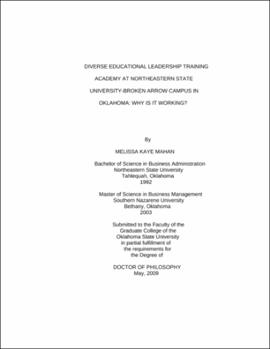| dc.contributor.advisor | Ausburn, Lynna J. | |
| dc.contributor.author | Mahan, Melissa Kaye | |
| dc.date.accessioned | 2013-11-26T08:34:42Z | |
| dc.date.available | 2013-11-26T08:34:42Z | |
| dc.date.issued | 2009-05 | |
| dc.identifier.uri | https://hdl.handle.net/11244/7493 | |
| dc.description.abstract | Scope and Method of Study: This study used a descriptive design in which quantitative subject profile data were expanded upon by qualitative data from focus group interviews. Specifically, institutional data from Northeastern State University and focus group interviews with DELTA graduates were used. The institutional data collected consisted of the following: demographics, academic information, preferred learning topics, and learning style preferences as measured by ATLAS. Data collected from focus groups related to perceptions of the DELTA graduates about the programs effectiveness. DELTA attracts a wide range of participants across age, gender, ethnicity and educational degree major. There were a high number of female participants and Education majors which is similar to the demographic data of Northeastern State University, Broken Arrow. DELTA used a variety of instructional methods, which contributed to its effectiveness. | |
| dc.description.abstract | Findings and Conclusions: DELTA attracts a wide range of participants across age, gender, ethnicity and educational degree major. There were a high number of female participants and Education majors which is similar to the demographic data of Northeastern State University, Broken Arrow. | |
| dc.description.abstract | DELTA used a variety of instructional methods, which contributed to its effectiveness. DELTA participants were diverse in age, learning strategies and educational backgrounds. This diversity made it critical for the instructional methods to be broad and inclusive. DELTA participants voiced feeling comfortable discussing sensitive topics in the environment and felt it was a safe place to be vulnerable about their feelings. One of the techniques used as a catalyst for exploration was appreciative inquiry. This approach allows students the ability to explore their inner most feelings, dreams and desires while in a safe environment. | |
| dc.description.abstract | DELTA has been an effective tool for leadership development for Northeastern State University. DELTA participants voiced they had gone through a transformation during the process of the course. Transformation theory encourages critical reflection with the focus on discovering the context of ideas and the belief systems that shape the way adults think. The DELTA program uses techniques which explore critical reflection and thinking and then moves the participant to taking action on the reflective insight. The effectiveness of the program in promoting transformational learning and leadership in a relatively short period of instruction is an important contribution of the study. | |
| dc.format | application/pdf | |
| dc.language | en_US | |
| dc.rights | Copyright is held by the author who has granted the Oklahoma State University Library the non-exclusive right to share this material in its institutional repository. Contact Digital Library Services at lib-dls@okstate.edu or 405-744-9161 for the permission policy on the use, reproduction or distribution of this material. | |
| dc.title | Diverse educational leadership training academy at Northeastern State University-Broken Arrow campus in Oklahoma: Why is it working? | |
| dc.contributor.committeeMember | Conti, Gary J. | |
| dc.contributor.committeeMember | Davis, C. Robert | |
| dc.contributor.committeeMember | Kutz, Mary N. | |
| osu.filename | Mahan_okstate_0664D_10279.pdf | |
| osu.accesstype | Open Access | |
| dc.type.genre | Dissertation | |
| dc.type.material | Text | |
| dc.subject.keywords | adult learners | |
| dc.subject.keywords | instrumented learning | |
| dc.subject.keywords | leadership | |
| dc.subject.keywords | moral courage | |
| dc.subject.keywords | self-leadership | |
| dc.subject.keywords | transformational leadership | |
| thesis.degree.discipline | Teaching and Curriculum Leadership | |
| thesis.degree.grantor | Oklahoma State University | |
